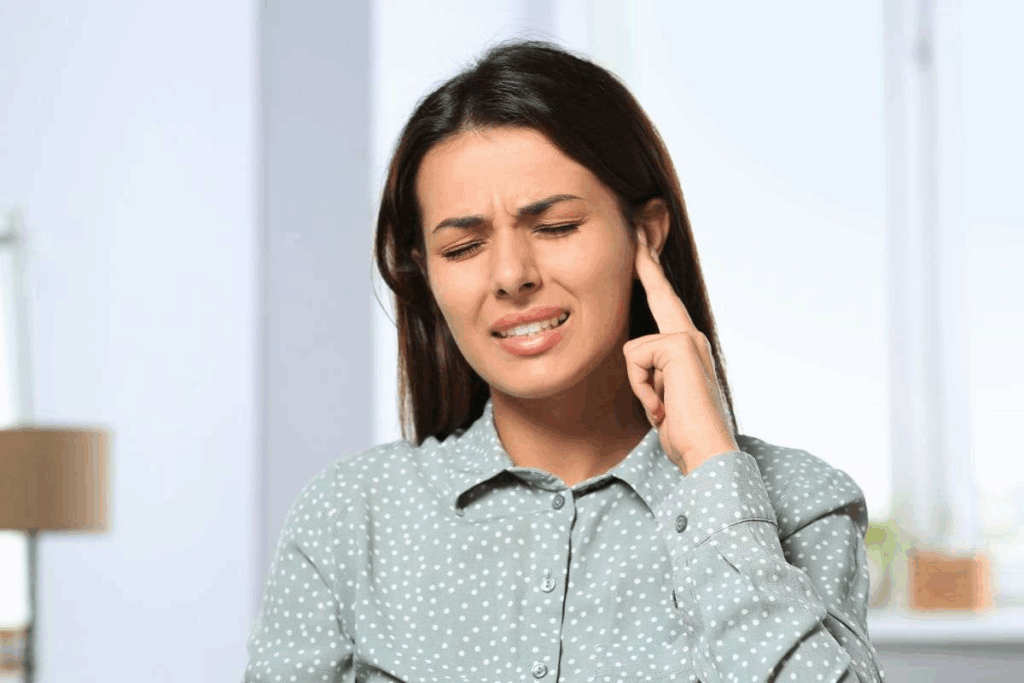
Ever woke up to find your ear clogged and ringing? Or felt a blocked sensation that muffled your hearing? You’re not alone. Millions worldwide face the frustrating mix of ear congestion and tinnitus. But many don’t know the causes or how to fix it.
Clogged and ringing ears can be really upsetting. They can come from earwax buildup, eustachian tube problems, or sinus pressure. Knowing what causes these symptoms is the first step to feeling better.
If you have earache with ringing, learn the causes, which can range from earwax buildup and infection to Eustachian tube dysfunction.
Key Takeaways
- Clogged and ringing ears are a common symptom complex affecting millions worldwide.
- Various causes contribute to this condition, including earwax buildup and sinus pressure.
- Understanding the underlying causes is key for effective management and relief.
- Proper evaluation and management can ease symptoms.
- With the right diagnosis and treatment, relief from clogged and ringing ears is possible.
Understanding Clogged and Ringing Ears

Clogged and ringing ears are common issues that need to be understood. They affect many people, causing discomfort and affecting their lives. Tinnitus, or ringing ears, is a condition that impacts a lot of people.
The Prevalence of These Symptoms
Tinnitus affects about 15% to 20% of people, more in older adults. It can be caused by hearing loss, ear injuries, or circulatory problems. Knowing how common it is helps us understand the need for better management.
How Normal Ear Function Works
The ear is a complex organ that needs many parts to work right. Sound waves go through the outer ear and into the ear canal. They hit the eardrum, making it vibrate.
These vibrations go through the middle ear bones to the cochlea in the inner ear. There, they turn into electrical signals. The brain then interprets these signals as sound. Problems in this process can cause tinnitus.
When to Seek Medical Attention
Occasional ear fullness or mild ringing might not be a big deal. But, if symptoms are persistent or severe, you should see a doctor. Look for sudden hearing loss, significant pain, or if ringing affects your daily life.
Getting medical help early can greatly improve your situation. It’s key for those with tinnitus or clogged ears.
Earwax Buildup: A Common Culprit

Earwax buildup is a common cause of clogged and ringing ears. Earwax protects against infections and dust. But too much can lead to hearing loss, discomfort, and tinnitus.
Development of Cerumen Impaction
Cerumen impaction happens when earwax blocks the ear canal. This can be due to using cotton swabs or having a narrow ear canal. Hard, compacted earwax makes it hard to come out naturally.
Factors that increase the risk of earwax buildup include:
- Using earplugs or hearing aids that can push earwax deeper into the ear
- Having a lot of hair in the ear canal, which can trap earwax
- Producing a lot of earwax naturally
- Having a condition that affects the ear canal, such as a bony growth
Signs of Excessive Earwax
Too much earwax can cause many symptoms. These include feeling of fullness, hearing loss, and tinnitus. You might also feel discomfort or pain in your ear.
If you’re experiencing these symptoms, see a healthcare professional. They can evaluate and treat you properly.
Safe Removal Methods
Removing earwax safely is important. Never use cotton swabs or other objects to dig into your ears. Here are safer ways:
- Ear irrigation: Using a syringe or ear irrigation device to gently flush out the earwax with water.
- Ear drops: Using over-the-counter ear drops to help dissolve the earwax.
- Professional removal: Consulting a healthcare professional or an ear, nose, and throat (ENT) specialist for safe removal.
Understanding earwax buildup and safe removal can help. It can relieve symptoms and keep your ears healthy.
Eustachian Tube Dysfunction Explained
The Eustachian tube is key to our ear’s health. Its problems can cause many uncomfortable symptoms. It connects the middle ear to the back of the nose and throat. It helps keep the ear’s pressure balanced.
The Role of Eustachian Tubes
The Eustachian tube does several important things:
- It regulates air pressure in the ears.
- It drains mucus from the middle ear.
- It protects the ear from loud sounds.
When we swallow, yawn, or chew, the Eustachian tube opens. This lets air move in or out of the middle ear. This is key for the eardrum to vibrate properly and for us to hear well.
Causes of Dysfunction
Several things can cause Eustachian tube problems, including:
- Upper respiratory tract infections: Colds, flu, and sinus infections can block or inflame the Eustachian tube.
- Allergies: Allergies can cause nasal congestion and Eustachian tube issues.
- Anatomical issues: A deviated septum or enlarged adenoids can block the Eustachian tube.
Symptoms Beyond Ear Stuffiness and Ringing
While ear fullness and tinnitus are common, Eustachian tube problems can also cause:
- Hearing loss: Muffled or distorted hearing because of trouble equalizing ear pressure.
- Ear pain: Discomfort or pain in the ear, often during changes in altitude or pressure.
- Dizziness or vertigo: In some cases, Eustachian tube problems can affect balance.
Knowing the causes and symptoms of Eustachian tube dysfunction is key. It helps find the right treatment and relief from its symptoms.
Sinusitis and Sinus Pressure Effects
It’s important to know how sinusitis affects our ears. Sinusitis, or inflammation of the sinuses, can really impact our ear health.
The Sinus-Ear Connection
The sinuses and ears are connected through the Eustachian tube. This tube helps control air pressure in the ears. When the sinuses get inflamed, it can mess with the Eustachian tube. This leads to ear congestion and discomfort.
The Eustachian tube’s role is key in keeping ear pressure right. If sinusitis blocks or messes with the tube, we might feel stuffy ears and hear ringing sounds.
Types of Sinusitis
There are different kinds of sinusitis, like acute, chronic, and recurrent. Each can affect our ears in different ways.
- Acute Sinusitis: Usually caused by a virus, leading to temporary sinus pressure and ear congestion.
- Chronic Sinusitis: Long-lasting inflammation that can keep causing ear health problems.
- Recurrent Sinusitis: Having sinusitis often can keep messing with ear pressure and comfort.
How Sinus Issues Trigger Ear Congestion Ringing
Sinus pressure from sinusitis can block the Eustachian tube. This blockage causes pressure in the ears, leading to congestion and tinnitus.
Symptom | Cause | Effect on Ear |
Sinus Pressure | Inflammation due to sinusitis | Eustachian tube dysfunction |
Ear Congestion | Eustachian tube blockage | Pressure buildup |
Tinnitus (Ringing) | Abnormal ear pressure | Discomfort and ringing sensation |
Understanding the link between sinusitis and ear health helps us tackle ear congestion and ringing better. This leads to more effective ways to find relief.
Earache with Ringing: Infection Causes
Ear infections are common in both kids and adults, causing earache and ringing. These infections can happen in different parts of the ear. This leads to various symptoms and complications.
Outer Ear Infections (Swimmer’s Ear)
Outer ear infections, also known as swimmer’s ear or otitis externa, happen when bacteria or fungi infect the outer ear canal. This condition often comes from water exposure, earning it the name “swimmer’s ear.” Symptoms include itching, redness, and discomfort in the ear canal. If not treated, it can lead to severe pain and discharge.
Middle Ear Infections (Otitis Media)
Middle ear infections, or otitis media, affect the middle ear space behind the eardrum. They are more common in children because of their shorter Eustachian tubes. Otitis media can be acute or chronic and may result in fluid accumulation, hearing loss, and pain.
Distinguishing Infection Symptoms
It’s important to tell apart outer and middle ear infections for the right treatment. Outer ear infections often cause discharge or itching. Middle ear infections, on the other hand, may lead to hearing loss and fever.
Symptom | Outer Ear Infection | Middle Ear Infection |
Discharge | Yes | No |
Hearing Loss | No | Yes |
Itching | Yes | No |
Fever | No | Yes |
Antibiotics and Other Treatments
Antibiotics are often given for bacterial ear infections, like middle ear infections and severe outer ear infections. The choice of antibiotic depends on the type of bacteria and the infection’s severity. For outer ear infections, ear drops might be used. Oral antibiotics are preferred for middle ear infections.
In conclusion, ear infections are a major cause of earache and ringing ears. Knowing the type of infection and its symptoms is key to choosing the right treatment. Always consult a healthcare professional for the best diagnosis and treatment.
Other Medical Causes of Clogged and Ringing Ears
Some medical conditions can cause ear problems like congestion and tinnitus. We’ll look at these conditions and how they affect ear health.
Ménière’s Disease
Ménière’s disease affects the inner ear, causing balance and hearing issues. It leads to vertigo, hearing loss, and tinnitus. The cause is not fully understood, but it’s linked to fluid imbalances in the inner ear.
Symptoms include vertigo, tinnitus, and hearing loss. Managing the disease involves lifestyle changes and medication to control symptoms.
Temporomandibular Joint (TMJ) Disorders
TMJ disorders affect the jaw joint and muscles. They cause jaw pain and dysfunction. The TMJ is close to the ear, leading to ear symptoms like tinnitus and fullness.
Treating TMJ disorders involves dental treatments, physical therapy, and pain management.
Acoustic Neuroma
An acoustic neuroma is a benign tumor on the auditory nerve. It causes tinnitus, hearing loss, and balance issues. Though non-cancerous, it can press on nerves, causing symptoms.
Treatment options include monitoring, surgery, or radiation therapy, based on the tumor’s size and growth rate.
Medication Side Effects
Some medications can cause tinnitus. These include antibiotics, cancer drugs, and diuretics. If you’re taking medication and have tinnitus, talk to your doctor about side effects.
Adjusting medications or dosages might help with tinnitus. Always consult a healthcare professional before making changes.
Diagnosis: How Doctors Identify the Cause
Diagnosing tinnitus and ear congestion involves a detailed process. It includes physical exams, hearing tests, and sometimes advanced imaging. Getting the diagnosis right is key to treating clogged and ringing ears well.
Physical Examination Techniques
Our first step is a thorough physical exam. We use otoscopy to look into the ear canal and eardrum. This helps us find blockages, infections, or damage.
We also check the ear’s overall health. This includes looking for earwax, foreign bodies, or structural issues. This info guides us in our next steps.
Hearing Tests and Tympanometry
Hearing tests, like audiometry, help us understand hearing loss. Tympanometry checks the middle ear’s function by changing air pressure. These tests are vital for diagnosing tinnitus and ear congestion.
- Audiometry: Measures hearing range and sensitivity, spotting hearing loss.
- Tympanometry: Tests middle ear function and eardrum mobility.
Advanced Imaging When Necessary
Sometimes, advanced imaging like MRI or CT scans are needed. They help us see the ear’s inner structures. This is to find complex issues that might be causing symptoms.
By combining physical exams, hearing tests, and imaging, we can pinpoint the cause. Then, we can create a treatment plan to help.
Treatment Options and Relief Strategies
Getting rid of clogged and ringing ears starts with finding out what’s causing it. We know it can be really upsetting. So, we’ll look at different treatments and ways to feel better.
Medical Treatments by Cause
The right treatment depends on the cause. For infections, antibiotics may be prescribed. If it’s Eustachian tube problems, you might get nasal decongestants or steroids to help.
For Meniere’s disease, you might need to change your diet. You could also take medicine for vertigo and tinnitus. Sometimes, surgery is needed to help symptoms.
Effective Home Remedies
Simple home remedies can help some people. For earwax, try ear drops or irrigating your ear. But don’t use cotton swabs, as they can push wax in further.
Other home remedies include the Valsalva maneuver to open the Eustachian tube. Steam inhalation can also help with sinus pressure.
When Surgery Might Be Needed
Sometimes, surgery is the only option. This is true for structural problems like tumors or serious ear damage. Surgery can help fix these issues.
Surgical Option | Description | Condition Treated |
Tympanoplasty | Surgery to repair the eardrum | Perforated eardrum |
Myringotomy | Insertion of tubes to drain fluid | Middle ear infections |
Acoustic Neuroma Removal | Surgery to remove a tumor | Acoustic Neuroma |
Emerging Therapies for Tinnitus and Blocked Ears
New research is bringing hope for tinnitus and ear congestion. Sound therapy is being tested for tinnitus. New drugs are also being developed to lessen symptoms.
We keep up with the latest in medical science. This helps us offer the best ways to help our patients feel better.
Conclusion
Learning about the causes and treatments for clogged and ringing ears can make a big difference. These issues can come from simple things like earwax buildup or more serious health problems.
We’ve looked at the different reasons, how to diagnose them, and the treatment options. Knowing the cause helps people get the right care for their symptoms. Managing tinnitus and clogged ears often needs a mix of medical help, home remedies, and sometimes surgery.
We want to give people the knowledge to tackle their ear problems. Whether it’s due to Eustachian tube issues, sinusitis, or other reasons, knowing the cause is the first step to feeling better.
FAQ
Why are my ears clogged and ringing?
Ears can get clogged and ring due to many reasons. These include earwax buildup, Eustachian tube issues, sinusitis, ear infections, and even Meniere’s disease.
What is the role of earwax in clogged and ringing ears?
Earwax protects the ear canal. But too much can cause clogged and ringing ears. Safe removal can help fix these problems.
How does Eustachian tube dysfunction affect the ears?
The Eustachian tube helps with ear pressure and drainage. If it doesn’t work right, you might feel ear fullness, muffled hearing, and tinnitus. Knowing why it’s not working is key to fixing it.
Can sinusitis cause clogged and ringing ears?
Yes, sinusitis can make your ears feel congested and ring. This is because the sinuses and ears are close together. Taking care of your sinuses can help your ears too.
What are the different types of ear infections that can cause tinnitus?
Ear infections like swimmer’s ear and otitis media can cause ear pain and tinnitus. Knowing the type of infection helps pick the right treatment, like antibiotics.
How is Meniere’s disease related to clogged and ringing ears?
Meniere’s disease affects the inner ear. It can cause vertigo, hearing loss, and tinnitus. It’s a complex condition that can lead to clogged and ringing ears.
Can TMJ disorders cause ear-related symptoms?
Yes, TMJ disorders can cause ear symptoms like tinnitus. This is because the TMJ is near the ear. Treating TMJ can help with these symptoms.
How do doctors diagnose the cause of clogged and ringing ears?
Doctors use many ways to find out why your ears are clogged and ringing. They might do physical exams, hearing tests, and even imaging like MRI or CT scans.
What are the treatment options for clogged and ringing ears?
Treatment varies based on the cause. It can be simple remedies for earwax, antibiotics for infections, or managing Meniere’s disease. Sometimes, surgery is needed.
Are there any emerging therapies for tinnitus and blocked ears?
Yes, new therapies are being developed for tinnitus and ear congestion. These offer hope for relief and are part of the growing list of treatments.
Why is my left ear clogged and ringing?
Left ear clogs and ringing can have the same causes as both ears. These include earwax buildup, Eustachian tube issues, and other conditions. Treatment depends on the cause.
Can certain medications cause or worsen tinnitus?
Yes, some medicines can cause or make tinnitus worse. Knowing the side effects of your medicines is important for managing tinnitus.
What is the connection between ear congestion and ringing?
Ear congestion and ringing can come from the same causes. These include Eustachian tube problems, sinusitis, and ear infections. Treating the cause can help with both symptoms.
Why did I wake up with a clogged ear and ringing?
Waking up with clogged ears and ringing can be due to many things. These include Eustachian tube issues, sinus pressure, or earwax buildup. Finding the cause is key to relief.
References
Biro, P., & Hofmann, M. (2016). Physiological effects of preoxygenation in adults and children. Current Opinion in Anesthesiology, 29(4), 485-491. https://journals.lww.com/co-anesthesiology/Abstract/2016/08000/Physiological_effects_of_preoxygenation_in_adults.15.aspx







